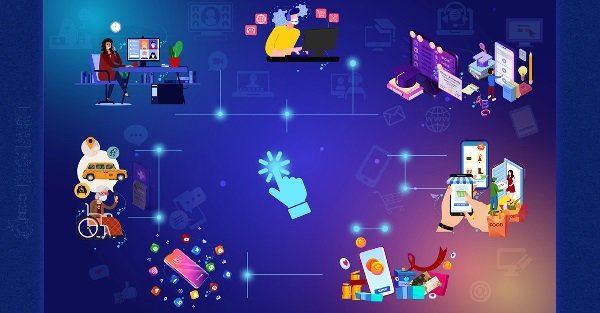Over the last couple of decades, we have witnessed a transition to a digitalized world for our everyday lives. From shopping to socializing, learning to entertainment, most of the facets of life have moved to the virtual side. It is, in fact, more than a modal shift—it is a means of revolutionizing our manner of living and behaving.
Shopping and Commerce
Perhaps one of the largest shifts in our day-to-day lives is the way we do shopping. E-commerce platforms have disrupted the retail industry by providing convenience, choice, and competitive prices. Consumers can buy just about anything, from groceries to gadgets, clothing to cars, online. This shift has given rise to global marketplaces such as Amazon and eBay, but also niche online stores that only serve very specific interests.
Now, even lottery tickets can be bought online, which has also generated a new level of convenience and accessibility with gaming. This change, in particular, has opened up entirely new markets and demographics in that users from areas that previously had no access to a given lottery can now participate.
Work and Collaboration
With remote work on the rise, the office has evolved as a digital space. There is many software that can help you facilitate team collaboration and streamline work despite geographical separation. Nowadays, the modern workspace is incomplete without video conferencing, cloud storage, and project management software. Such developments have made work more geographically independent, fostering an inclusive diverse global workforce.
Education and Learning
Digital transformation has made its impact on education as well. Increased access to education through online courses, e-learning platforms, and virtual classrooms can be achieved in the comfort of our homes. This has enabled students to listen and often engage in live lectures, discussions, and exams from a computer thousands of miles away. Thus, anyone with access to the Internet now have many online resources that will allow them to continue their lifelong learning journey.
Healthcare
Through telemedicine and online health consultations, patients can now seek medical advice without leaving their homes. This is especially good for people who have limited mobility or are just slightly too far from the nearest health care center. Meanwhile, digital health records and e-prescriptions have made healthcare administration more productive and less error-prone.
Social Interaction and Entertainment
Social media platforms rewrote the laws of social interaction by keeping us in touch with friends and family wherever they choose to live. With online gaming, streaming services, and virtual reality experiences, entertainment options have become various times larger than they were just a few decades ago. In the process, these platforms have created communities and brought people together based on shared interests and passions.
Banking and Finance
The way most of us pay and transfer money has largely moved online, a trend that can be seen with banking. Finance has been transformed into a digital service that can be completed quicker, simpler, and usually more secure than ever before—from moving money to taking out loans, from handling investments to submitting taxes. Another sign of this changing financial landscape is the increasing popularity of cryptocurrencies and mobile money.
Impact on Society
Digital change has been a game changer in our society. It is better than traditional software in every way except that there are challenges to face. So, for everyone to benefit from the journey online, It is crucial to address cybersecurity, privacy, and broadband access issues.
The shift to online has also affected workers, as some jobs have become redundant, and new positions have emerged. Add to that the long-running arguments over what technology is doing to our mental health and the nature of our human relationships. We sometimes can’t help but question if communicating through messages is darkening human interaction.
Conclusion
The digital shift has affected practically every aspect of our lives. as technology advances, more and more of the daily activities we participate in are going to be web-based. While this comes with a lot of benefits, it is important that we navigate these changes carefully while ensuring there continues to be equilibrium between the virtual and real world or between convenience and meaningfulness.











